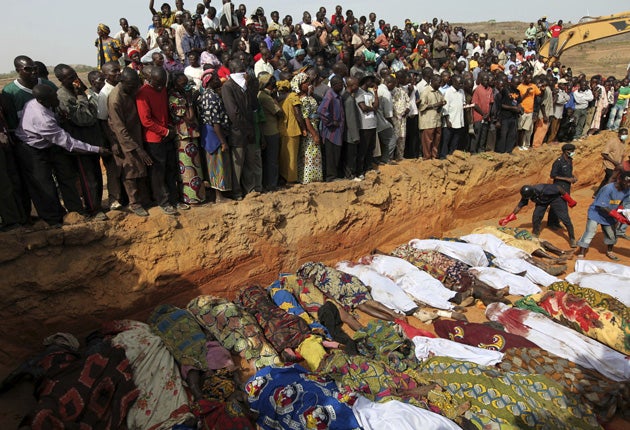Nigeria killings spark fears of wider conflict
Soldiers out in force in city where more than 500 people feared dead

Soldiers were out in force last night in the troubled Nigerian city of Jos where aid workers were still counting the dead after a sectarian massacre in which hundreds of villagers were hacked to death or burned in their homes.
Jos has become an explosive fault line between the country's Muslim dominated north and predominantly Christian south. Sunday's killings left Nigeria's already embattled acting-President Goodluck Jonathan scrambling to avoid a full scale conflict in a state that has been rocked by religious violence in recent years.
Estimates of the numbers varied widely with one state official claiming more than 500 had been killed, while a Christian aid worker said that 93 had been counted in one village alone. Police would confirm no more than 100 victims, but were still counting.
Authorities said troops had been sent to the state's borders to prevent arms or militants coming in and stop the clashes from spreading.
Funerals had already begun yesterday in the mainly Christian villages south of Jos that bore the brunt of the raids. In some places, bodies still lined the streets while in others Red Cross workers were examining the charred remains in an effort to identify victims, officials said. The latest attacks, launched in the early hours of Sunday, have been blamed on the Fulani, Muslim herders who locals say descended on communities just south of Jos.
"It seems the perpetrators were the Fulani and it may have been a reprisal attack," said Robin Waubo, a spokesman from the International Red Cross.
Thousands have died in sectarian violence in this region. Analysts said the raids may have been a reprisal for attacks on Muslim communities that left as many as 300 dead in January.
Survivors described men, women and children being hacked to death with machetes as they tried to flee their homes during the onslaught and homes and businesses were burned to ground.
"There has been a lot of destruction of houses and property and many people managed to flee," said Mr Waubo.
Even the death toll will be highly politicised in an area where ethnic and religious divisions have poisoned politics and turned Jos into one of the more volatile cities in Africa's most populous countries.
The Red Cross said it could not confirm numbers of dead as workers had been sent to morgues, hospitals and villages. "For now we must concentrate on helping the living," said Nigerian Red Cross spokesman Seyi Soremekun.
At nearby morgues witnesses reported seeing the bodies of young children in twisted piles, while some bodies appeared to show signs of rape or mutilations.
The massacre has given a shocking physical face to political divisions that are already threatening to pull apart Africa's leading energy producer along ethnic and sectarian lines. Mr Jonathan, who has stepped in after the prolonged illness of President Umaru Yar'Adua, appears to have little support from the country's powerful state governors and is already being accused of upsetting the north-south balance.
The government continues to maintain that Mr Yar'Adua could make a recovery but sources close to the presidency say that is close to impossible, while some reports suggest he may have suffered serious brain damage.
Join our commenting forum
Join thought-provoking conversations, follow other Independent readers and see their replies
Comments